ECS (Elastic Cloud Storage) - Dell EMC Cloud Storage Platform
Volumes of unstructured data are growing exponentially, and it does not seem to slow down. Some organizations still manage to manage them using traditional storage infrastructure, but it is expensive and does not support scaling in accordance with the growth of data.
However, these problems are far from the only ones. IT budgets remain at the same level or slightly increase (by about 5% per year), and capital expenditures of most organizations each year almost double. In addition, companies need to maintain and improve the level of service, spending on it less resources.

The growth of data volumes (and, accordingly, requirements for storage infrastructure) is not a temporary trend, and if companies do not transform their business on time, they will face very serious problems. But the development of technology allows you to find the right solutions. So, the company Dell EMC - the world's largest supplier of storage systems - has created a cost-effective cloud platform ECS.
')
First of all, it should be noted that ECS is not a public Cloud Storage, when the user does not know where his data is stored. In contrast, Dell EMC (Elastic Cloud Storage ) is a physical storage array (although there is also a software version), and the client chooses where to place it. And ECS is called cloud storage, because the system can be used for exactly this purpose.
ECS software allows you to store, administer and analyze unstructured data in a large-scale infrastructure from typical components. This is a comprehensive multi-user cloud storage platform that allows you to take into account resource consumption and independently allocate them.
Customers can purchase ECS as a ready-made software / hardware system (Dell EMC ECS Appliance solution) or as a software product (ECS software): it is installed on the customer’s servers and model drives certified by Dell EMC. ECS includes an unstructured data storage module that supports object management services and HDFS, as well as file services support.
Technically, this system is:
The system configuration includes 4/8 nodes. The capacity of the solution reaches 3840 TB per rack.
ECS is the third generation object storage system. It allows you to:
Advantages of object storage:
Businesses and cloud service providers can use ECS as the basis for “digital transformation”. Traditional business applications are now replaced by cloud-based ones — and ECS bridges the gap between the “second” and “third” platform applications, allowing them to use a single storage system. ECS not only copes with a huge amount of unstructured data - as a multipurpose platform it takes on a variety of workloads and is able to prepare a company for any challenges.
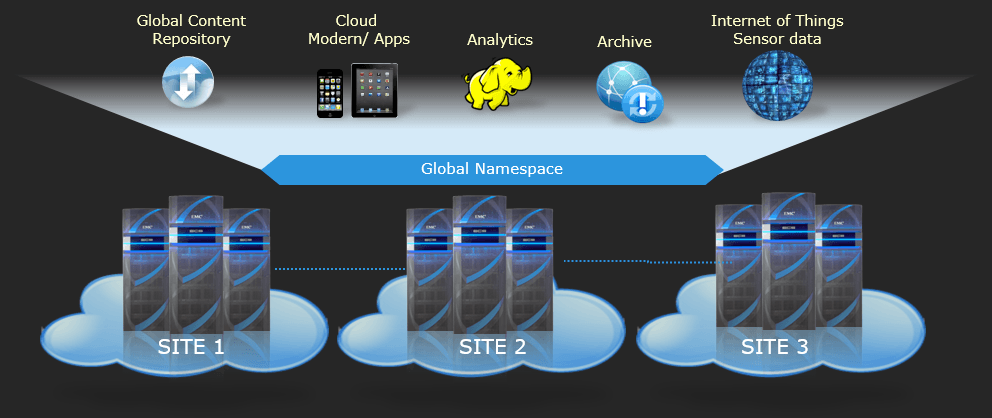
ECS is compatible with HDFS, OpenStack Swift and Amazon S3, as well as Centera and Atmos APIs. At customer's choice, it can be deployed as a fully integrated solution that scales to 3.8 PB per rack, or as a software solution for storing data on certified hardware. In addition, ECS is available via a pay-per-use subscription. Thanks to this, the system is gaining popularity among corporate clients and service providers.
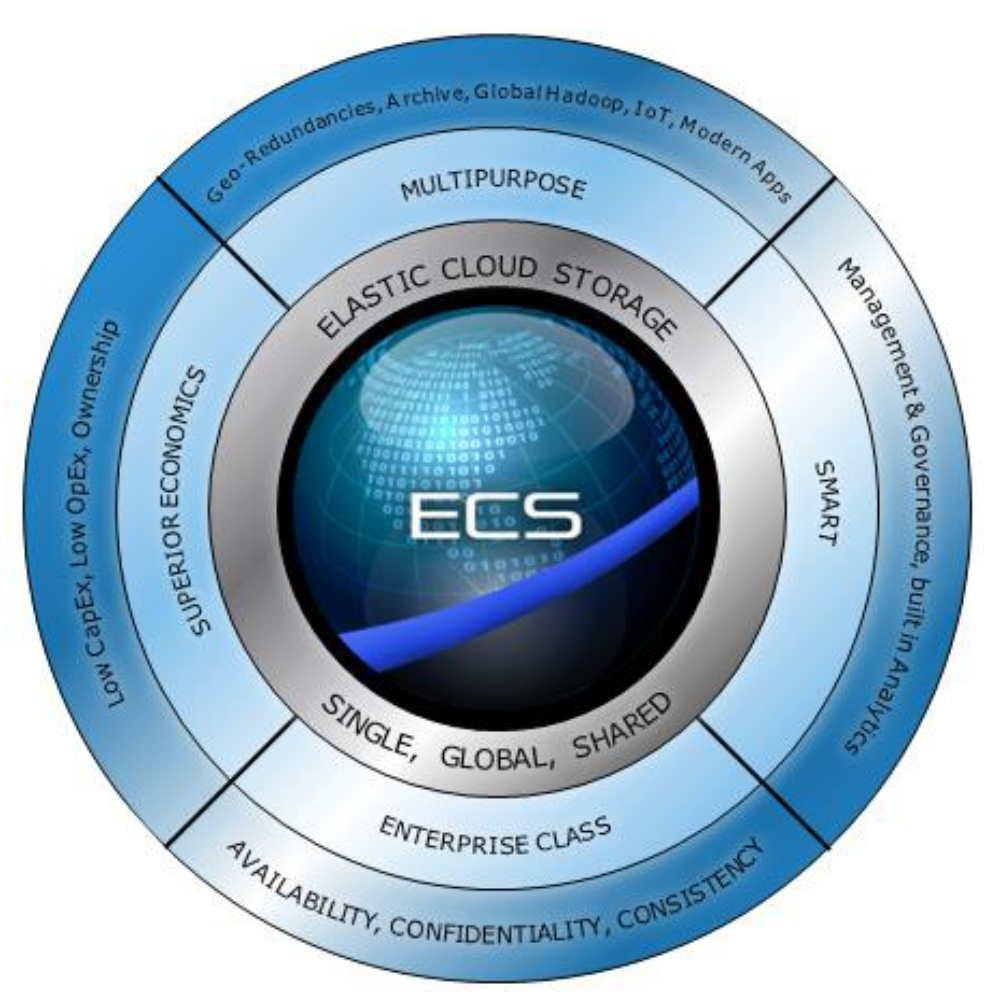
The manufacturer positions ECS when required:
ECS platform is used as:
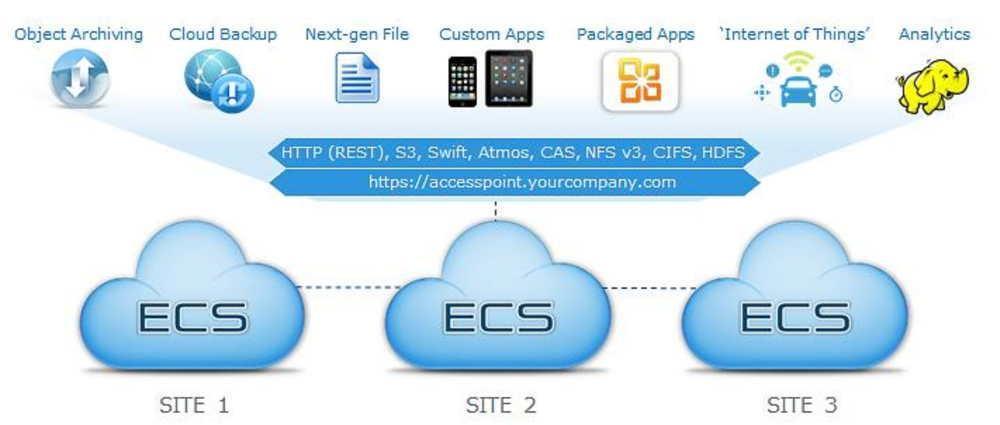
Here are a few options for using ECS with other Dell EMC storage systems:
Case 1: ECS Combination with Dell EMC Cloud Array. File services and storage for remote offices without deploying a storage array on a remote site.
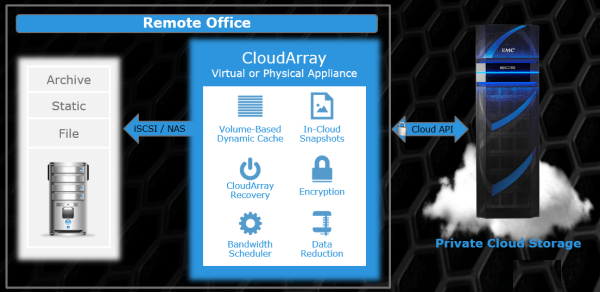
Example 2. Combination of ECS with Isilon (cloud pools). Isilon (horizontal-scale NAS) with automatic file transfer to low-cost storage according to specified rules.
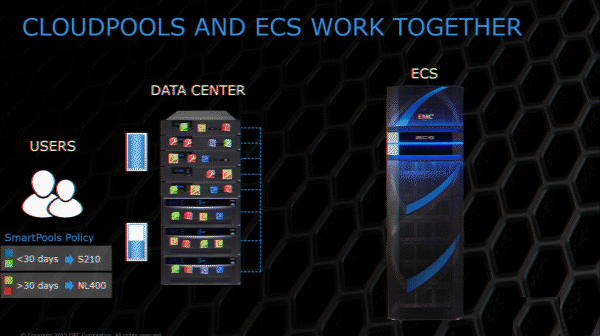
Example 3. Classic archiving. ECS is used as an archive.
Example 4: Combination with Dell EMC Cloud Boost. Long-term data storage.
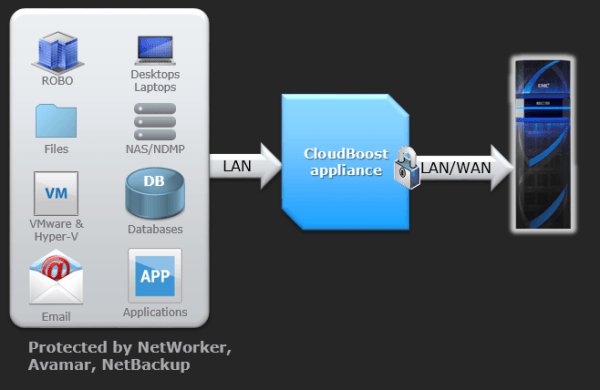
Example 5. Development using object storage. Mobile applications have become so advanced that they are difficult to associate with known data storage protocols (FC, NAS) without a “gateway” —for example, a web server. Thanks to ECS, mobile applications get direct access to the repository using HTTP / HTTPS and can get or save the necessary objects.
The ECS platform was released in June 2015. Now more than 250 clients use it, and many of them have an installation capacity exceeding petabyte. ECS supports objects, NFS and Hadoop Distributed File System (HDFS), which allows it to store billions of files for cloud applications.
However, these problems are far from the only ones. IT budgets remain at the same level or slightly increase (by about 5% per year), and capital expenditures of most organizations each year almost double. In addition, companies need to maintain and improve the level of service, spending on it less resources.

The growth of data volumes (and, accordingly, requirements for storage infrastructure) is not a temporary trend, and if companies do not transform their business on time, they will face very serious problems. But the development of technology allows you to find the right solutions. So, the company Dell EMC - the world's largest supplier of storage systems - has created a cost-effective cloud platform ECS.
')
What is ECS?
First of all, it should be noted that ECS is not a public Cloud Storage, when the user does not know where his data is stored. In contrast, Dell EMC (Elastic Cloud Storage ) is a physical storage array (although there is also a software version), and the client chooses where to place it. And ECS is called cloud storage, because the system can be used for exactly this purpose.
ECS software allows you to store, administer and analyze unstructured data in a large-scale infrastructure from typical components. This is a comprehensive multi-user cloud storage platform that allows you to take into account resource consumption and independently allocate them.
Customers can purchase ECS as a ready-made software / hardware system (Dell EMC ECS Appliance solution) or as a software product (ECS software): it is installed on the customer’s servers and model drives certified by Dell EMC. ECS includes an unstructured data storage module that supports object management services and HDFS, as well as file services support.
Technically, this system is:
- Intel x86 server with JBOD shelves connected to it (up to 60 disks per server),
- 10GbE network adapters for connecting nodes.
The system configuration includes 4/8 nodes. The capacity of the solution reaches 3840 TB per rack.
ECS is the third generation object storage system. It allows you to:
- consolidate the resources of the main storage and increase the return on investment;
- upgrade traditional and legacy applications to make better use of storage;
- Accelerate the introduction of cloud applications with new features for business.
Advantages of object storage:
- Access to objects is provided by specialized protocols. Unlike block or file, they work on top of HTTP and are based on REST: S3, Swift, Atmos.
- Focusing on the storage of unstructured information (any files that are static or dynamic content on the client side).
- Each object has a unique address.
- Global object namespace: any object is available at any time from any infrastructure segment.
What is ECS convenient for?
- Efficiency. ECS is a feature-rich platform that offers multiple use cases and protects your investment in Dell EMC storage infrastructure. It simplifies management, increases flexibility, and most importantly - reduces costs. In terms of scaling, ECS is one of the most cost effective solutions on the market. According to a study by the Enterprise Strategy Group (ESG), storing files in ECS is at least 60% more profitable compared to other cloud services.
- Integration with existing storage environment. ECS “expands” the cloud to the main storage and allows you to release storage infrastructure using Dell EMC cloud computing solutions (CloudPools, CloudBoost, CloudArray, etc.). Customers can display inactive data from primary storage (Isilon, VMAX Series, VPLEX, VNX Series, Vx Series, Data Domain, Data Protection Suite, etc.) to the cloud by moving them to ECS. Such consolidation of resources allows not to buy additional and more expensive platforms and significantly increases the efficiency of the existing storage environment.
- Prompt and ubiquitous data access. The ECS object platform can dramatically improve response time and speed up data access compared to traditional NAS. Data is protected by encoding and distributed across all nodes in the system, providing instant read / write access from anywhere. At the same time, the latest copy of the data is available, which simplifies application development. Support for geocaching also makes access more efficient through intelligent system recognition of operation patterns: it minimizes WAN traffic and improves latency.
- Ease of application development. A single global namespace does not require developers to access complex NFS file systems. They can focus on building applications, not on the details of operations. By upgrading traditional applications in the object store, users gain additional resources, access to content via the Internet, and global accessibility through a single namespace. In addition, they can make optimal use of storage resources in the data center. Native cloud applications take full advantage of the cloud infrastructure.
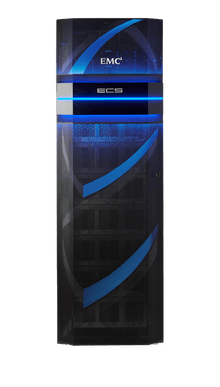
- The user has access to all the advantages of software-defined storage. The ECS platform makes full use of the software-defined architecture, which allows independent scaling of computing and storage resources. All data in ECS is containerized; There is no hardware dependency, there is no need to recode or reconfigure applications, since ECS provides support for multiple protocols. This allows developers to more quickly innovate and bring their applications to the market.
Digital transformation is easy
Businesses and cloud service providers can use ECS as the basis for “digital transformation”. Traditional business applications are now replaced by cloud-based ones — and ECS bridges the gap between the “second” and “third” platform applications, allowing them to use a single storage system. ECS not only copes with a huge amount of unstructured data - as a multipurpose platform it takes on a variety of workloads and is able to prepare a company for any challenges.

ECS is compatible with HDFS, OpenStack Swift and Amazon S3, as well as Centera and Atmos APIs. At customer's choice, it can be deployed as a fully integrated solution that scales to 3.8 PB per rack, or as a software solution for storing data on certified hardware. In addition, ECS is available via a pay-per-use subscription. Thanks to this, the system is gaining popularity among corporate clients and service providers.

The manufacturer positions ECS when required:
- distributed architecture
- global namespace (all data centers with active / active nodes, geoprotection, multiprotocol access and metadata search).
ECS usage scenarios
ECS platform is used as:
- Global content repository. This relatively easy-to-implement solution provides global file access and enterprise-level data protection.
- Large-scale implementation of big data analytics. The system provides global analytics of data from geographically distributed archives. It is an economical high-density storage solution for Hadoop.
- Modern platform for applications. ECS supports multiple APIs and protocols, and its active / active architecture is optimized for storing and accessing data.
- Cold archiving system of inactive data. Allows you to create archives, ready to support future applications, and optimizes existing storage environments.
- Deploy management platform for the Internet of Things (IoT). The IoT architecture is effective for working with large amounts of unstructured data. And on the recent Dell EMC World 2017 forum, it was announced that IoT streaming is now possible in ECS.

Here are a few options for using ECS with other Dell EMC storage systems:
Case 1: ECS Combination with Dell EMC Cloud Array. File services and storage for remote offices without deploying a storage array on a remote site.

Example 2. Combination of ECS with Isilon (cloud pools). Isilon (horizontal-scale NAS) with automatic file transfer to low-cost storage according to specified rules.

Example 3. Classic archiving. ECS is used as an archive.
Example 4: Combination with Dell EMC Cloud Boost. Long-term data storage.

Example 5. Development using object storage. Mobile applications have become so advanced that they are difficult to associate with known data storage protocols (FC, NAS) without a “gateway” —for example, a web server. Thanks to ECS, mobile applications get direct access to the repository using HTTP / HTTPS and can get or save the necessary objects.
The ECS platform was released in June 2015. Now more than 250 clients use it, and many of them have an installation capacity exceeding petabyte. ECS supports objects, NFS and Hadoop Distributed File System (HDFS), which allows it to store billions of files for cloud applications.
Source: https://habr.com/ru/post/331506/
All Articles